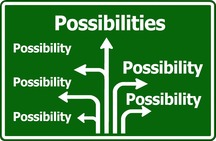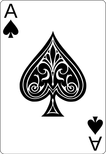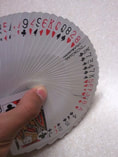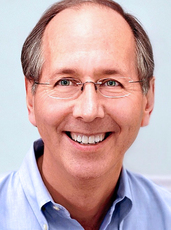Truth is stranger than fiction, but it is because Fiction is obliged to stick to possibilities; Truth isn’t. –Mark Twain
How Could that Be?
Or did it come to you from a place of wonder and curiosity: “How could that be?” [Wow! I can’t wait to find out!]
It’s not that learning has the aim of dumbing us down. There’s a kind of agenda-free discovery that builds wisdom.
Still, I find that “knowing stuff” often narrows my perspective, perhaps an unintentional result of a system that wants us to learn…but in fact rewards us for being right and embracing what’s widely accepted. Figuring-it-out-based “intelligence” can alienate those who are not already onboard. It defeats my purpose of wanting to “connect and enroll”—a dynamic, instead, of “comply and cajole.”
The Multiple Possibility Waveform—An Experiment

Try this experiment: a traditional “right answer” lens, and an alternative “multiple possibility waveform” lens. Apply them to a controversy you are experiencing. My example: a potential client wrote wanting to defer work, so she can do other healing first.
For the “right answer” lens, rest in the mode we normally inhabit. What’s the right answer? How do I figure it out? Is it this one? Is it that one? What happens if I get it wrong? My example: should I say “Whatever supports you?” “Maybe that’s a signal to DO coaching, vs. delaying it?” Or something else? There is energy in trying to figure out what this client should do, and how to support that outcome.
Now: notice what you’re feeling. For me, it’s an easy, comfortable place. My mind gets busy with “figuring it out” energy. (In my example, how does this relate to other clients who’ve deferred?)But there’s also considerable anxiety—since it feels like there’s only one right answer, what happens if I miss it? That anxiety keeps me in my head and defensive. I’m closed to new possibilities.

My example: the client emailed, so initially I limited thoughts about my own response to email as well. But, would it be better to call? More anxiety as there’s more right/wrong choices! As I start to go down a path to the right answer, I’ve spent so much time trying to justify my selection, I find I’m rather attached to that choice.The “comfort” is that of a prison cell—familiar, yet limiting and cold.
Yeeesh!

In my example, I realize I’m taking responsibility for a choice that’s not mine. As I relinquish the fear of being wrong, I open to a greater sense of trust in myself and my client, and a relaxed way to communicate, including some pros and cons. A vibration emerges that feels like it’s building relationship, hope, and well-being, whatever the decision. And I feel my heart open, too, as I relax into playful curiosity…maybe even a greater intelligence
Let's Play! Where?
Or, consider “traditional” vs. “restorative” justice. Focusing on judging guilt and assigning punishment, the traditional system hasn’t done so well in preventing infractions or reducing recidivism--let alone healing the anguish crime and its punishment create. Restorative justice aims at repair rather than judgment—of the infraction, the circumstances, and healing the wounds to all parties involved. When victims, offenders and community members meet, the results can be transformational. I’m studying it!
Where else? Artificial Intelligence researchers are building smarter systems by leaving room for questions—e.g., self-driving algorithms that slow/signal when alternative views arise.
Extra!
So, do your own experiments on allowing multiple possibilities and keeping ambiguity open. And share what you discover here!


 RSS Feed
RSS Feed
